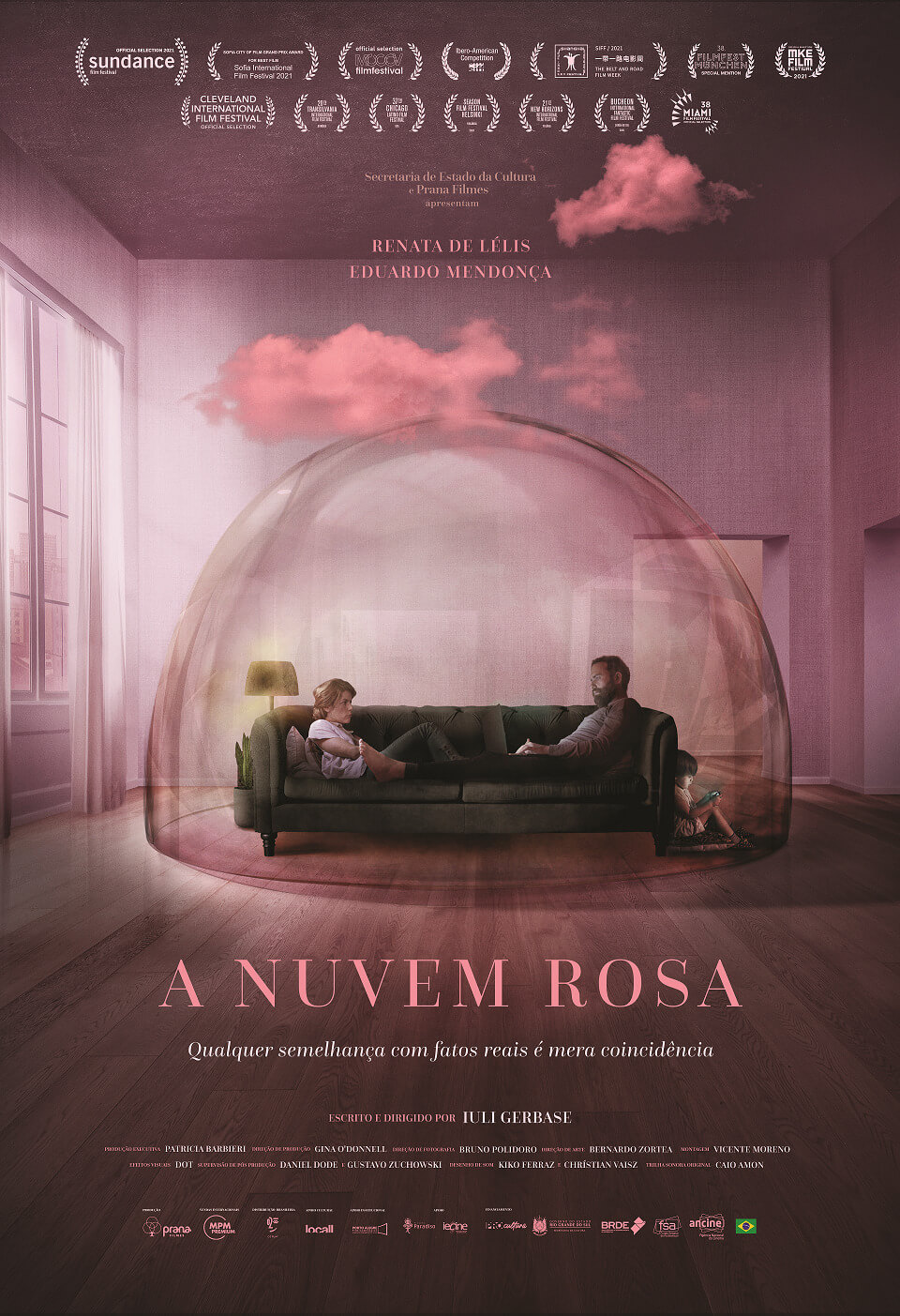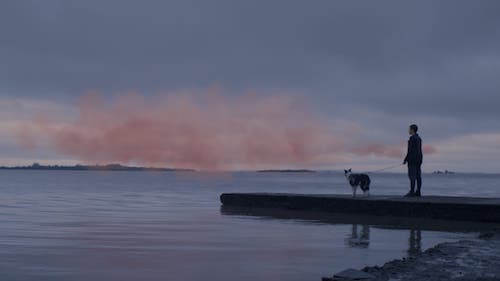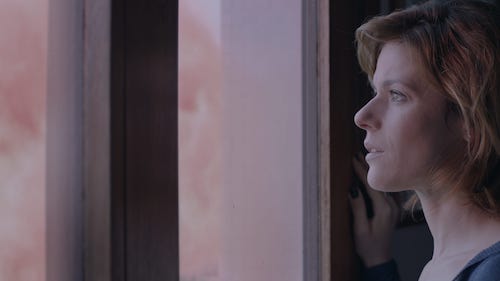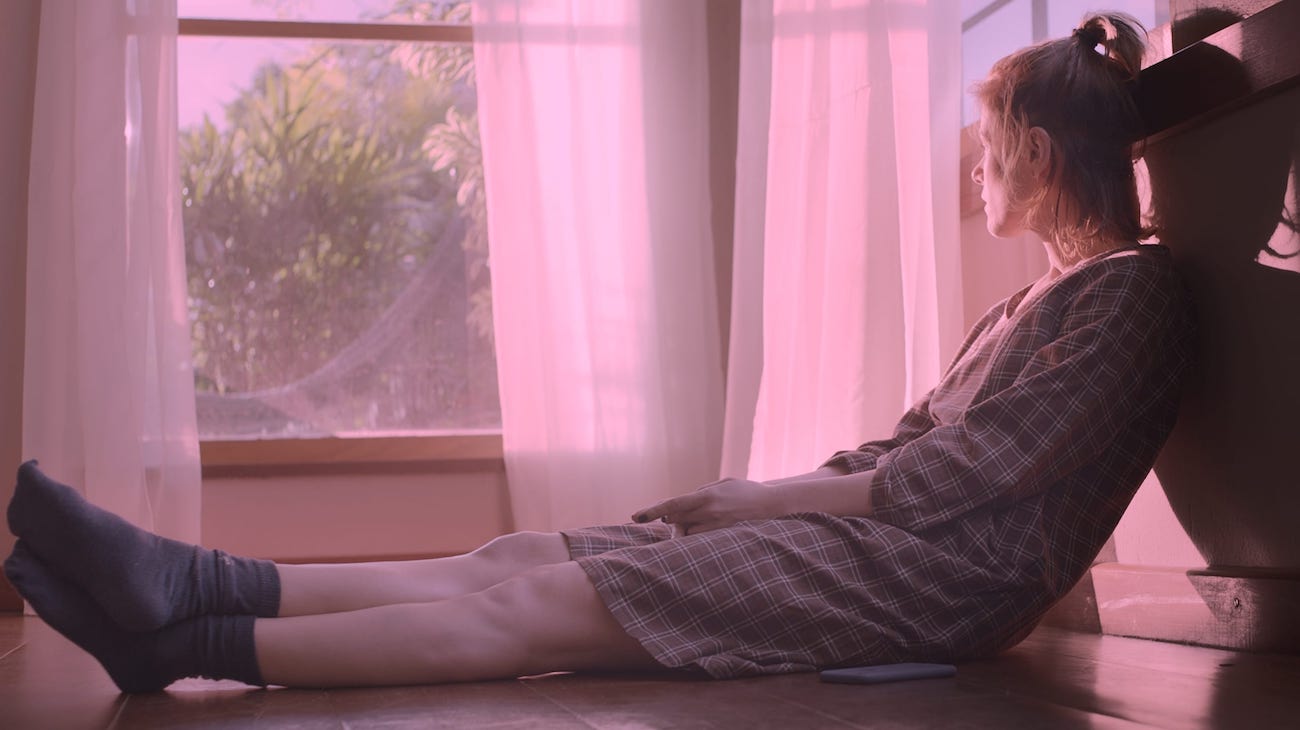
Scenes from a Pandemic Marriage
Also check out Chris’s interview with Iuli Gerbase, writer-director of The Pink Cloud
As The Pink Cloud opens, on-screen text states “this film was written in 2017 and shot in 2019. Any resemblance to actual events is purely coincidental.” Knowing nothing going into the film, I thought it was strange to include comments like that at the beginning, when usually a disclaimer toward the end of the end credits will suffice.
The film then transitions into a shot reminiscent of Tarkovsky’s The Sacrifice with muted blues and greens of a lovely waterside city park. Yet also, we see a seductive, cotton candy pink-colored cloud slowly drifting across the water, where a man and his dog stand observant. The man stands amidst the cloud for ten seconds, before collapsing in a heap; the dog yips away. The film cuts to the Portuguese title, “A NUVEM ROSA”, and the text font fades from white to light pink to deep magenta.

Here now we meet our two protagonists, Giovana (Renata de Lélis) and Yago (Eduardo Mendonça), waking up from a one-night stand on a Brazilian beach. Yet their morning is quickly interrupted by an alarm siren with a speaker demanding all people to immediately seek shelter inside, close all doors and windows, and not leave. We soon realize that this pink cloud is an airborne toxin and a global, potentially alien pandemic that is forcing the entire world to quarantine to avoid imminent death (the cloud does not seep through building cracks). So, Giovana and Yago seek shelter in her relative’s nearby spacious apartment. Strangers less than 24 hours earlier, these two have to wait it out and see what happens over the coming days… months… years…
So, as this movie was written and shot before the world went to hell with a once-in-a-century pandemic, clearly, first time writer/director Iuli Gerbase is a time-traveling wizard. There’s no other logical explanation. And Iuli, indeed, confirmed this in my interview with her! This makes entirely too much sense.
Given my conversation with Gerbase, apparently, the only thing that COVID-19 added to the script was a sense of scope. While her team was completing post in quarantine, they quickly realized that their story is something that nearly everyone on the planet can relate to, and so they chose to suggest the film’s toxin as a global phenomenon, thus adding a news clip early on showing the pink cloud in London.
The prologue, mentioned above, is excellently structured, and it portends greatness. The colors are lovely, the orchestral warming-up is a wonderful choice, and the absence of dialogue eerily sets the tone. Alas, the rest of the movie doesn’t match this opening greatness, but there are moments over which to goggle.
The real focus of the story is based in metaphor. As the pink cloud becomes increasingly darker in its hue, so must these characters consider more deeply what they want and who they want to be. While Yago is initially scared by the whole ordeal, he quickly realizes he can get what he wants out of this situation: a lovely home, a beautiful wife, and even children. Meanwhile, the pink cloud continues to pressure Giovana into reluctantly accepting what she’s never wanted before: the opposite of Yago’s dreams and desires. And so, we have a metaphor for looking inward to accept what you want, for not marrying in haste, and for the societal pressures forced upon women, whether they want them or not.
The writing is fairly smart, and I was eager to intellectually explore its ideas further. However, the metaphor doesn’t hold up the structure of a 104-minute feature-length movie. There were multiple occasions where I was surprised with the amount of time remaining. Indeed, several of the various side stories probably should’ve been cut, or at least shortened for efficiency’s sake.
Brazilian actors de Lélis and Mendonça (the former has few feature credits to her name, while the latter is making his feature debut) do an admirable job with perhaps overstretched characters. But even as their characters are the two protagonists, the story’s focus is clearly most interested in her, and so was I. Both her performance and character arc reminded me Olivia Colman’s Leda in Maggie Gyllenhaal’s The Lost Daughter; a film that Gerbase herself loves. Both characters are forced into a world they never truly wanted, and now seek an escape.
I also appreciated Gerbase’s attention to detail with the set itself. As she says in her interview, she’s fully aware that most Brazilians don’t live in such spacious splendor, but that it would’ve been more difficult for Yago to buy into his new “gift” of a home if it was merely a 300-ft studio apartment. Clearly, the team put a lot of effort into the apartment’s design. I appreciated the increasing amount of small changes to its aesthetics; like its residents, it is damaged over time.
Though the real star of the movie is the pink cloud itself, which certainly is its own character – one wrapped in multiple metaphors. The cloud’s initial pink hue is very welcoming and lovely at first; its seductively sweet nature felt akin to Emerald Fennel’s pinks in Promising Young Woman. But as the movie progresses, so does the darkening of the color. Gerbase and DP Bruno Polidoro go to great lengths to constantly remind the viewer of the cloud’s existence; frequently, they bathe the characters and set in this deepening pink, and I was increasingly intoxicated by its allure. It also had a terrific musical theme, one of discordant melodies that never seem to fully stretch out of their initial warm-up. Its visual and sonic design make for one of the more unnerving entries to sci-fi cinema in recent years.

As mentioned, I don’t think there was enough story to tell for a 100-minute movie. If the script were tighter and some scenes were edited down or cut altogether, the film and its overall pacing would’ve improved. That said, Gerbase shows real talent here; I’m impressed by her grasp of intimate, character-driven science fiction. Both Jonathan Glazer’s Under the Skin and Lars von Trier’s Melancholia were inspirations for The Pink Cloud, and it’s at least evident to me that Gerbase’s skills could fit into this niche quite nicely. She indicated to me the possibility of staying in sci-fi, and I say great. Roland Emmerich, Michael Bay, and their protégé have the market cornered for large-scale alien invasion movies. I’m always in the mood for Scenes from a Marriage if Marianne and Johan were forced to survive a seemingly extraterrestrial existential threat; Bergman missed his chance. I’m highly looking forward to what Gerbase produces next.
Chris Trengove has a BFA in acting, an MA from the University of Denver in international relations, and during the day, he works for the economic development agency of Northern Ireland. While he's lived in Denver, Washington D.C., and Beijing, he calls Chicago home and has for most of his life. He lives with his wife (Laura) and two young boys (Aiden and Callum), and within a 20-minute walk of the Music Box Theater. Follow Chris on Letterboxd and Twitter.
As The Pink Cloud opens, on-screen text states “this film was written in 2017 and shot in 2019. Any resemblance to actual events is purely coincidental.” Knowing nothing going into the film, I thought it was strange to include comments like that at the beginning, when usually a disclaimer toward the end of the end credits will suffice.
The film then transitions into a shot reminiscent of Tarkovsky’s The Sacrifice with muted blues and greens of a lovely waterside city park. Yet also, we see a seductive, cotton candy pink-colored cloud slowly drifting across the water, where a man and his dog stand observant. The man stands amidst the cloud for ten seconds, before collapsing in a heap; the dog yips away. The film cuts to the Portuguese title, “A NUVEM ROSA”, and the text font fades from white to light pink to deep magenta.

Here now we meet our two protagonists, Giovana (Renata de Lélis) and Yago (Eduardo Mendonça), waking up from a one-night stand on a Brazilian beach. Yet their morning is quickly interrupted by an alarm siren with a speaker demanding all people to immediately seek shelter inside, close all doors and windows, and not leave. We soon realize that this pink cloud is an airborne toxin and a global, potentially alien pandemic that is forcing the entire world to quarantine to avoid imminent death (the cloud does not seep through building cracks). So, Giovana and Yago seek shelter in her relative’s nearby spacious apartment. Strangers less than 24 hours earlier, these two have to wait it out and see what happens over the coming days… months… years…
So, as this movie was written and shot before the world went to hell with a once-in-a-century pandemic, clearly, first time writer/director Iuli Gerbase is a time-traveling wizard. There’s no other logical explanation. And Iuli, indeed, confirmed this in my interview with her! This makes entirely too much sense.
Given my conversation with Gerbase, apparently, the only thing that COVID-19 added to the script was a sense of scope. While her team was completing post in quarantine, they quickly realized that their story is something that nearly everyone on the planet can relate to, and so they chose to suggest the film’s toxin as a global phenomenon, thus adding a news clip early on showing the pink cloud in London.
The prologue, mentioned above, is excellently structured, and it portends greatness. The colors are lovely, the orchestral warming-up is a wonderful choice, and the absence of dialogue eerily sets the tone. Alas, the rest of the movie doesn’t match this opening greatness, but there are moments over which to goggle.
The real focus of the story is based in metaphor. As the pink cloud becomes increasingly darker in its hue, so must these characters consider more deeply what they want and who they want to be. While Yago is initially scared by the whole ordeal, he quickly realizes he can get what he wants out of this situation: a lovely home, a beautiful wife, and even children. Meanwhile, the pink cloud continues to pressure Giovana into reluctantly accepting what she’s never wanted before: the opposite of Yago’s dreams and desires. And so, we have a metaphor for looking inward to accept what you want, for not marrying in haste, and for the societal pressures forced upon women, whether they want them or not.
The writing is fairly smart, and I was eager to intellectually explore its ideas further. However, the metaphor doesn’t hold up the structure of a 104-minute feature-length movie. There were multiple occasions where I was surprised with the amount of time remaining. Indeed, several of the various side stories probably should’ve been cut, or at least shortened for efficiency’s sake.
Brazilian actors de Lélis and Mendonça (the former has few feature credits to her name, while the latter is making his feature debut) do an admirable job with perhaps overstretched characters. But even as their characters are the two protagonists, the story’s focus is clearly most interested in her, and so was I. Both her performance and character arc reminded me Olivia Colman’s Leda in Maggie Gyllenhaal’s The Lost Daughter; a film that Gerbase herself loves. Both characters are forced into a world they never truly wanted, and now seek an escape.
I also appreciated Gerbase’s attention to detail with the set itself. As she says in her interview, she’s fully aware that most Brazilians don’t live in such spacious splendor, but that it would’ve been more difficult for Yago to buy into his new “gift” of a home if it was merely a 300-ft studio apartment. Clearly, the team put a lot of effort into the apartment’s design. I appreciated the increasing amount of small changes to its aesthetics; like its residents, it is damaged over time.
Though the real star of the movie is the pink cloud itself, which certainly is its own character – one wrapped in multiple metaphors. The cloud’s initial pink hue is very welcoming and lovely at first; its seductively sweet nature felt akin to Emerald Fennel’s pinks in Promising Young Woman. But as the movie progresses, so does the darkening of the color. Gerbase and DP Bruno Polidoro go to great lengths to constantly remind the viewer of the cloud’s existence; frequently, they bathe the characters and set in this deepening pink, and I was increasingly intoxicated by its allure. It also had a terrific musical theme, one of discordant melodies that never seem to fully stretch out of their initial warm-up. Its visual and sonic design make for one of the more unnerving entries to sci-fi cinema in recent years.

As mentioned, I don’t think there was enough story to tell for a 100-minute movie. If the script were tighter and some scenes were edited down or cut altogether, the film and its overall pacing would’ve improved. That said, Gerbase shows real talent here; I’m impressed by her grasp of intimate, character-driven science fiction. Both Jonathan Glazer’s Under the Skin and Lars von Trier’s Melancholia were inspirations for The Pink Cloud, and it’s at least evident to me that Gerbase’s skills could fit into this niche quite nicely. She indicated to me the possibility of staying in sci-fi, and I say great. Roland Emmerich, Michael Bay, and their protégé have the market cornered for large-scale alien invasion movies. I’m always in the mood for Scenes from a Marriage if Marianne and Johan were forced to survive a seemingly extraterrestrial existential threat; Bergman missed his chance. I’m highly looking forward to what Gerbase produces next.
Chris Trengove has a BFA in acting, an MA from the University of Denver in international relations, and during the day, he works for the economic development agency of Northern Ireland. While he's lived in Denver, Washington D.C., and Beijing, he calls Chicago home and has for most of his life. He lives with his wife (Laura) and two young boys (Aiden and Callum), and within a 20-minute walk of the Music Box Theater. Follow Chris on Letterboxd and Twitter.
Categories: brazilian cinema, domestic dramas






